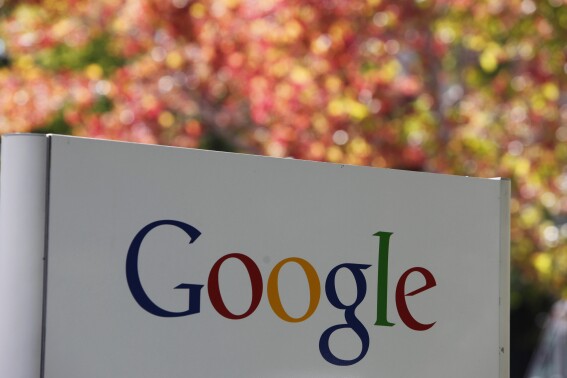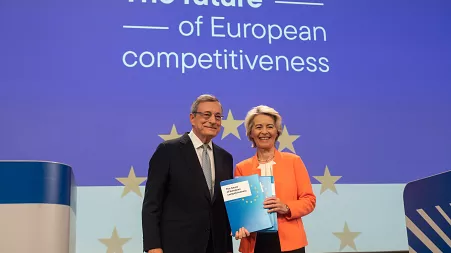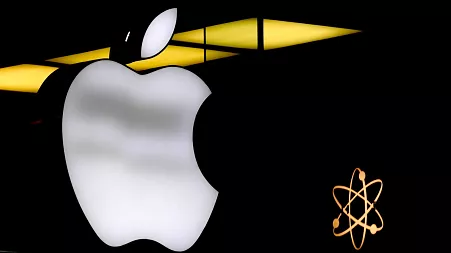It will require more integration. Qualified majority voting – rather than unanimity – should be extended to more areas. And there will need to be vast new public subsidies for investments that the private sector can’t finance by itself.
The former president of the European Central Bank and Italian prime minister Mario Draghi on Monday released his major report on restoring the competitiveness of the European Union. But hold on. In reality, even “Super Mario”, as he used to be known in the financial markets, can’t rescue a failing system.
The EU unveils strategies to re-boot its economy every few years, and none of them make any difference – because it is the institution itself that is to blame.
In his 400 page report, Draghi laid out the challenges facing the European economy. It has fallen behind the United States, China and now India as well. Growth is flat, and often negative. Debts are rising all the time, and generous welfare models are becoming increasingly unaffordable.
“For the first time since the Cold War, we must genuinely fear for our self-preservation,” he argued, launching the report. If the EU doesn’t start to grow again, then it may well be doomed.
In fairness, no one could dispute Draghi’s analysis, or his ability to make the case for radical changes. As president of the European Central Bank, he was rightly credited with rescuing the euro in 2012, preventing the break-up of the single currency, even if it involved quietly bailing out member states with printed money and long-term consequences that have yet to be seen.
And as PM of Italy, he helped restore the country’s finances, and made some modest reforms to boost growth, even if they have done little to improve its two-decades long stagnation. If anyone can make the case for genuine reform, he can.
So what’s the plan?
The report argues that competition rules should be relaxed in industries such as telecoms to allow genuine European giants to emerge; further integration of capital markets, with powers centralised, to make it easier to raise money for investment; a revamped trade strategy, which sounds suspiciously like protectionism, to secure the continent’s independence; and most ambitiously of all, an €800m (£675m) “industrial strategy” financed largely by money borrowed from Brussels, to carve out a slice of some of the major technology sectors where it is falling badly behind its major rivals.
To people for whom “more Europe” and “more debt” are the answers to almost every problem, the report will no doubt be hailed as a masterful plan for restoring the bloc’s place in the global economy. The trouble is, strategies for boosting the continent’s competitiveness come around every few years.
The Lisbon Strategy, of which Sir Tony Blair was a key architect, was launched in 2000, with the aim of making Europe the “most dynamic, knowledge-based economy in the world” within a decade. When 2010 rolled around, with little sign of it happening, it launched Europe 2020, with the ambition of creating “sustainable, smart, and inclusive growth across the European Union” by the end of the decade.
Given the lack of progress, in 2019 we had Europe’s “Green New Deal”, which was much the same as all the other plans, except with more wind power added in, followed by the “Coronavirus Recovery Fund”, with €750bn of extra spending which, according to France’s President Macron, was a “turning point” for the European economy.
The list goes on and on. It is almost as if the people writing the reports haven’t noticed that the internet makes it easier than ever to look up all the past goals, and think that simply cutting and pasting the same remedies from five, 10 or 20 years ago will impress us.
The blunt reality is that the EU’s problems are too deep to be fixed from the top. Government spending is already way too high, hitting an alarming 58pc of GDP in France, 55pc in Italy, and almost as much in many other member states.
Welfare spending is far too generous, with the continent accounting for around half of the world’s social spending even though it accounts for less than 7pc of the world’s population, and 15pc of global GDP.
Perhaps most of all, the EU has turned the single market, originally designed to boost its competitiveness, into a regulatory monster that crushes growth with bureaucratic regulations that ban innovation before it has even be tried, make it almost impossible for entrepreneurs to launch new products, and increasingly closes the continent off from the rest of the world.
We see more and more evidence of that with every week that passes. The once mighty auto industry, in which only a few years ago Europe was a global leader, is now on its knees, with Volkswagen considering German factory closures for the first time in its history, brought down by green rule that took no account of the competition from the rest of the world.
And as Apple launched the iPhone 16 on Monday, the built-in artificial intelligence that is one of its key features won’t initially be available in Europe because the rules make it too difficult.
Draghi’s report does not seem to address any of those issues. Instead of proposing a radical decentralisation of power, stripping the Brussels machine of its grip on industry, and working out ways of reducing the tax burden on small businesses and start-ups, it delivers the same old tired formula of more integration, more subsidies, and more protectionism.
If that was going to work, it would have worked in 2000, in 2010, and 2019. Instead, the continent just falls further and further behind the rest of the world, retreating into a genteel poverty from which there will be no easy escape. And even Super Mario shows little sign of grasping that.
His report may join all the other action plans that have failed dismally.
Disclaimer: The copyright of this article belongs to the original author. Reposting this article is solely for the purpose of information dissemination and does not constitute any investment advice. If there is any infringement, please contact us immediately. We will make corrections or deletions as necessary. Thank you.



